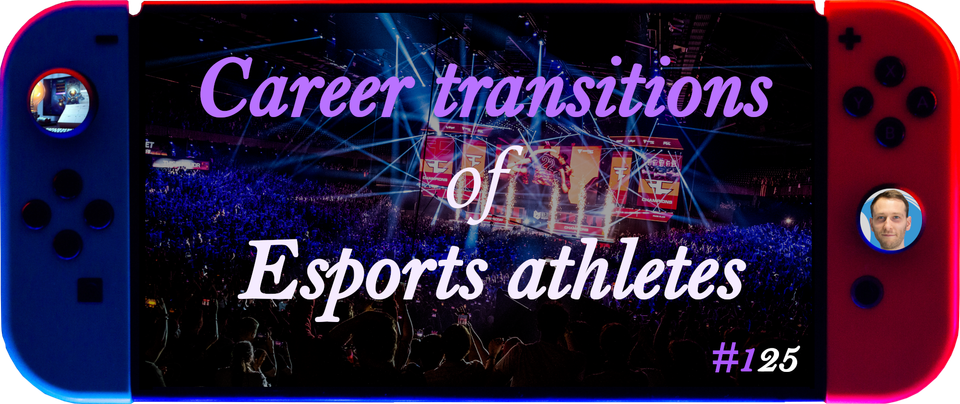Navigating Life After Esports: Career Paths and Skills for Retired Pro-Gamers

Retiring esports athletes often face uncertainty and limited options. However, they often opt for two career paths that require the skills they acquired during their time as pro-gamers. Learn more below.
• 80% of esports athletes retire before the age of 30.
• After retirement, esports athletes typically pursue two career paths: either becoming a coach (~5% of them) or a commentator/streamer.
• Esports athletes bring important skills to the table that enable them to thrive in both jobs.
• Furthermore, psychological strengths such as resilience and self-efficacy help them transition.
• However, what happens to lower-achieving esports athletes is not clear.
Did you know that 80% of esports athletes retire before the age of 30? Due to the growing engagement of young people in gaming and esports, many face, or will face within a short period as esports athletes, retirement. However, being an esports athlete is such a new career path. It often does not come with the same social or financial standing as traditional jobs. Hence, transitioning out of it may be hard and full of uncertainties, and players often face many choices on what to do afterward.
In traditional sports, athletes often transition out of sports not because of a lack of skill, but rather the availability of better choices. In this sense, retirement is seen as a social rebirth.
In esports, however, players state that "aging is the most significant challenge that limits their professional career..." [1]. Moreover, risks such as changing bodies, physical and active performance, or chronic pain from injury are factors that may force a player to retire, as they also negatively impact well-being at retirement.
Interestingly, there hasn't been much research conducted on the retirement or career transformation of esports athletes. So in this episode, we will take a closer look at potential paths for retirement and the useful skills acquired during their time as esports athletes.
2️⃣ Career Options for Retired Esports Athletes
After interviewing pro-players, coaches, and managers from various games (CS, Overwatch, League of Legends, Starcraft, and Honor of Kings), here's what they found.
In essence, two appropriate career transformation options were named:
- becoming a coach or head tournament admin. However, this path was seen as quite difficult, and only about 5% went down this path.
"In terms of coaching, excellent teaching and management experience was claimed to be essential." [1]
Moreover, coaches are in charge of developing tactical and strategic plans. Esports athletes who become coaches have critical advantages to fill these positions because:
"... professional players who have become coaches are equipped with judgment, critical analysis, and layout skills, as most of them played the role of team leader during their service." [1]
- The second named career pathway after retirement was becoming an esports commentator.
"Participants choose this career route for three reasons: the transition is rapid and low risk, and it comes with a high income." [1]
From a business standpoint, this choice makes sense for multiple reasons.
- It's pretty cheap to fire up a stream and talk. One interviewee said that his income is now 3x compared to what he made as a professional player.
- You know the game you commentate inside and out, meaning you have a very different and more in-depth view compared to the majority of players. It's easy to assume that this is something the viewers value.
- You already have some kind of (or even big) following from your time as a competitive player. This kind of clout makes it easier to gain followers, subs, gigs, etc.
During the interviews, psychological strengths were identified. These strengths were gained during their time as athletes and are helpful in transitioning.
"[Hope and optimism: ]We found that retiring athletes had sustained positive and achievable goals for themselves, in both the short- and long-term. Moreover, their habit of setting motivational goals was usually carried over to future career development planning." [1]
Self-efficacy stems from confidence. To be successful as an esports athlete, you need to be confident in your own abilities, communicate well, and have good decision-making skills. Such skills will make you more confident and have you believe in yourself.
Another psychological strength was resilience. If you're good at coping with difficulties and recovering from adversity, you have a critical advantage. Resilience often shows in tournaments, e.g., clutches (someone 1vx-ing the enemy team) or a reverse sweep (being down 2:0 and then winning 3 games in a row to win 3:2 in a Best-Of-Five).
Another crucial aspect is social networks. As an esports athlete, you play in many different teams (changing teams) and with different players (roster swaps). As a result, you get to know many high-skilled and "important" people (including team staff, organizational management, league operators, etc.). These connections will make it easier for you to get in touch with people who can help you achieve your goals (becoming a commentator or coach).
🥡 The Takeaways
Although there is not a clear path for retiring esports athletes, most of them appear to take the most logical steps: becoming a coach or commentator/streamer. However, this only covers those who are typically achieving. But what about the ones who never "really" made it big? Well, from my experience, most of them disappear completely (quitting esports) and get back to a more traditional life—studying, getting a 9-to-5 job, etc. However, a few examples come to mind of those who go down the path of becoming streamers.
Read you next Sunday. Cheers,
Christian 🙂







